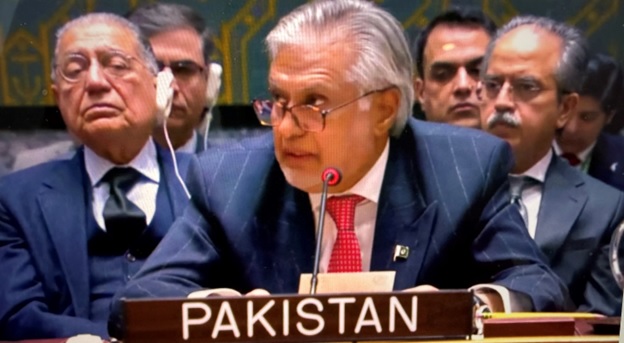
Dar Calls for Self-Determination for Kashmiris and Palestinians at UN Conference
By Elaine Pasquini
New York: Muhammad Ishaq Dar, deputy prime minister and foreign minister of Pakistan, addressed the United Nations Security Council (UNSC) on February 18, 2025, on the subject “Practicing Multilateralism: Reforming and Improving Global Governance.” Pakistan is currently a non-permanent member of the 15-member UNSC for the term 2025-2026.
The ministerial meeting was convened by China as a signature event during its presidency of the Security Council and was chaired by Wang Yi, foreign minister of China.
Deputy PM/FM Dar welcomed China’s initiative, emphasizing the need for international cooperation and commitment to multilateralism to address emerging global challenges. He called for upholding the principles of the United Nations charter, including self-determination, respect for sovereignty, and the peaceful resolution of disputes without the use of force.
Expressing deep concern over the grave situation in the Illegally Occupied Palestinian Territories, including Gaza, Dar strongly condemned the massive loss of civilian lives and persistent violations of international law by Israel. He called for the full implementation of the agreement to secure a permanent ceasefire in the Gaza Strip and the deliverance of urgent humanitarian aid to the Palestinians. In addition, the political process to achieve the two-state solution with a viable, sovereign State of Palestine based on pre-1967 borders, with Al-Quds Al-Sharif as its capital, must immediately be revived. Dar forcefully rejected any displacement of the Palestinian people from their homeland.
Highlighting the rights of the Kashmiri people suffering under illegal occupation by India to self-determination, Deputy PM/FM Dar called upon the international community to seek a peaceful resolution of the Jammu and Kashmir conflict in accordance with the relevant United Nations Security Council resolutions and the wishes of the Kashmiri people.
Dar also proposed the adoption of a roadmap for strengthening multilateralism and reforming global governance. He emphasized the need for a more inclusive, democratic, and accountable Security Council and to reform the international financial architecture along with strengthening international cooperation to address emerging challenges. Of particular importance, he stressed, is the need to regulate transformative technologies, such as artificial intelligence.
Also, during his stay in New York City, Deputy Prime Minister/Foreign Minister Dar engaged with members of the Pakistani diaspora. He highlighted Pakistan’s economic progress and investment opportunities and reaffirmed the commitment of the Shehbaz Sharif-led government to Pakistanis living overseas, recognizing their vital role in the country’s national development.
The PM/FM was accompanied on these events by Pakistani Ambassador to the US Rizwan Saeed Sheikh, Pakistan’s Permanent Representative to the United Nations Ambassador Munir Akram, Deputy UN Permanent Representative Ambassador Asim Iftikhar and Consul General to New York Aamer Ahmed Atozai.
Members of the New York City-area Pakistani community were thankful to have the opportunity to meet with Deputy Prime Minister/Foreign Minister Dar during this stressful time of change in the United States.
(Elaine Pasquini is a freelance journalist. Her reports appear in the Washington Report on Middle East Affairs and Nuze.Ink.)

